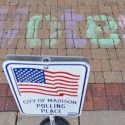UW-Madison election stories and experts: Voting rights, youth turnout, foreign interference
The following UW–Madison experts can comment on current topics surrounding the presidential election. See more here.
Legal experts on absentee ballot decisions and election law
Miriam Seifter is an assistant professor of law and an expert on state constitutional law. She’s available for interviews to discuss the recent SCOTUS suggestion that it may sideline state courts in matters related to election administration and prioritize the role of state legislatures. Contact: miriam.seifter@wisc.edu
Rob Yablon, an assistant professor of law and an expert on SCOTUS and election law, is available for analysis of recent SCOTUS decisions pertaining to the election, such as absentee ballots, and the possible role of the court in decisions that could affect the outcome of the election. Contact: robert.yablon@wisc.edu
Howard Schweber is an associate professor of political science and legal studies and an expert in constitutional law, democratic theory, and politics. He’s available to discuss:
- The Supreme Court and the new conservative majority
- How this election relates to the rulings in Bush vs. Gore
- Constitutional doctrines concerning voting rights and elections
- The constitutional protection of voting rights
- The history of constitutional and political conflicts over access to voting
Schweber says, “The Roberts Court has already demonstrated itself to be generally hostile to the idea that federal courts have a role to play in protecting access to voting; the new Court is likely to go even farther in transferring all authority over voting go state governments which are themselves the products of gerrymandering and related practices that the Roberts Court has refused to consider a subject for consideration by federal courts.”
Contact: schweber@polisci.wisc.edu
Foreign interference on digital platforms, election integrity
Young Mie Kim is a professor in the School of Journalism and Mass Communication and an expert whose research on foreign interference in elections on social media was among the first of its kind. She is also an expert on election integrity/security, disinformation/misinformation campaigns and voter suppression. Contact: ymkim5@wisc.eduTh
Turnout spikes among young people
Data on early voting suggests the youth vote could be historic this year. Connie Flanagan, an expert on civic engagement among young people, is available for interviews about the voting boom among young people.
She says, “Youth turnout is due to a combination of factors — increased awareness of issues of social justice and existential threat and youth leadership in prominent movements for social change — from BLM to climate change to March for Our Lives. For those voting for the first time, education and outreach — from campus and community-based organizations — about how to register, what documents one needs – has been critical. In the midst of the pandemic, youth are stepping forward to replace their grandparents as poll workers on Nov. 3. After people vote for the first time, it tends to become a habit. So if youth turnout is a record in 2020, we can expect to hear from Gen Z for years to come.” Contact: caflanagan@wisc.edu
Wisconsin COVID-19 surge
Early voting in Wisconsin is taking place in the midst of a COVID-19 surge. Jeffrey Pothof, assistant professor of emergency medicine and a practicing emergency room doctor, is available to discuss the surge of COVID-19 cases in Wisconsin, and what he’s seeing at the UW Hospital in terms of shortages of available beds and critical care nurses and physicians. Pothof can share impressions of the human story unfolding and why he says Wisconsin is in new territory.
Contact: EKumlien@uwhealth.org
Polling place violence?
The potential for violence at voting places is a concern this year, with the possibility of armed militia and other vigilante groups appearing at polls. Ken Mayer, a professor of political science, is available for interviews about the story.
He recently told USA Today, “It could be enormously volatile and dangerous.” Contact: kmayer@polisci.wisc.edu
In addition to those above, more experts can be found on the UW–Madison Experts page.
Tags: media tips, political science

